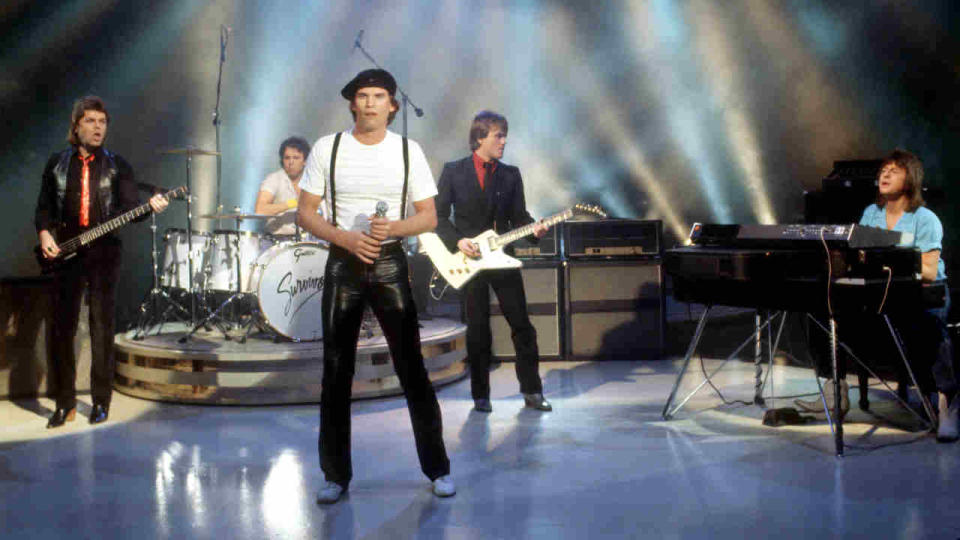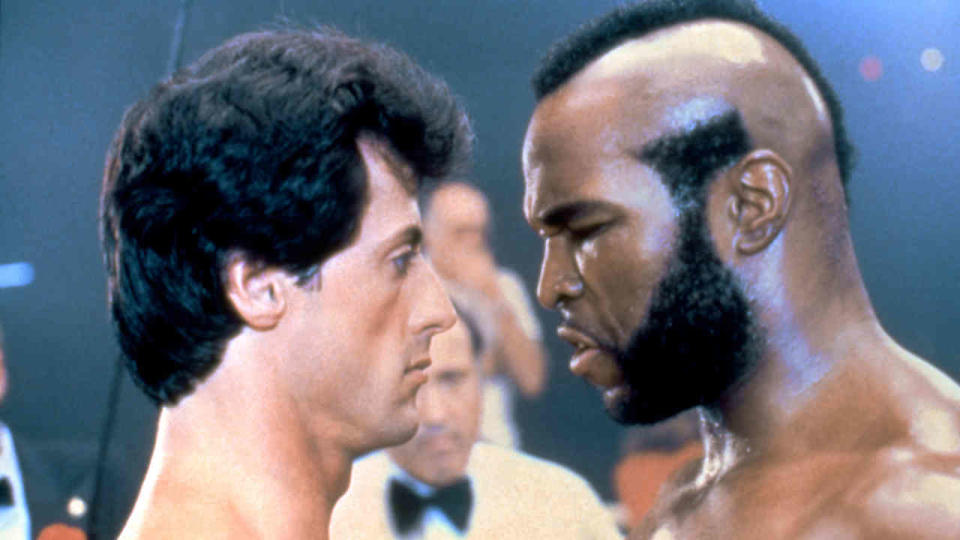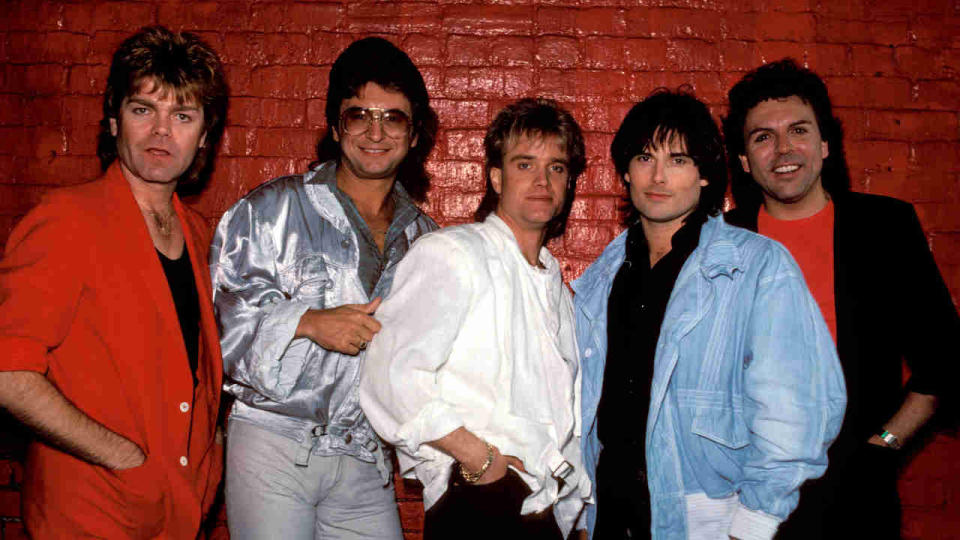“We begged Stallone to send us the whole movie. When he did, we were blown away”: Survivor were just another struggling AOR band. And then Rocky III and Eye Of The Tiger changed everything

- Oops!Something went wrong.Please try again later.
- Oops!Something went wrong.Please try again later.
- Oops!Something went wrong.Please try again later.
- Oops!Something went wrong.Please try again later.
- Oops!Something went wrong.Please try again later.
- Oops!Something went wrong.Please try again later.
It happened all of 28 years ago, but Jim Peterik remembers with perfect clarity the moment he knew that he’d created an American anthem and rock classic.
Eye Of The Tiger, written by keyboard player Peterik with guitarist Frankie Sullivan for their band Survivor, had just hit US radio. And as the theme song for Rocky III, the new instalment in Sylvester Stallone’s hugely successful movie franchise, it was picking up heavy airplay.
One week after the four members of Survivor attended the film’s Hollywood premiere, Peterik saw a public screening of Rocky III at his local cinema in a Chicago suburb.
“The place was packed,” he recalls. “As soon as that guitar riff started, the whole audience was cheering! I got chills all over.
“The premiere was cool – the red carpet, the cameras flashing,” he continues. “But in that little theatre in my hometown, when everybody went crazy as they heard that song, that’s when I knew we had a smash on our hands, something that touched the people. I thought, holy crap, we got something here!”
Peterik’s instincts were correct. In the summer of 1982, Eye Of The Tiger topped the US chart for six weeks and also hit No.1 in the UK. It made Survivor a household name throughout the world and remains one of the most popular rock songs of all time. Across the years it has served as the soundtrack to countless boxing matches and other sporting events, and is currently ranked in the Top 50 most downloaded tracks in history.
As Jim Peterik proudly states: “That song is an amazing part of the Survivor story.”
And it is a story much like the Rocky saga to which this band is forever linked, a tale of heroism and heartbreak, triumph and failure, disaster and redemption. Although, for Survivor, there was no Hollywood ending.

When Survivor formed in 1977, the first wave of American AOR music was flourishing, led by bands like Boston and Foreigner, whose debut produced Top 10 US hits in Feels Like The First Time and Cold As Ice. Inspired by the rock songs he was hearing on the radio, Jim Peterik formed a clear and simple vision for Survivor as “a great commercial rock band”.
At 26, Peterik was already a veteran of the music business. His first successful band, The Ides Of March, scored a US No.2 hit in 1970 with his song Vehicle, which at the time was the fastest-selling single ever released by the Warner Bros label. But with no follow-up hit, despite tours with Led Zeppelin and Neil Diamond, the band split in 1973.
Peterik subsequently fronted three acts that went nowhere – Jim Peterik And The Chi-Town Hustlers, Jim Peterik And Shy Rhythm, and then, inevitably, The Jim Peterik Band. But after the latter’s album for Epic Records, Don’t Fight The Feeling, bombed in 1976, Jim found a kindred spirit in Frankie Sullivan, a hot guitar player and Peter Frampton lookalike.
Peterik had been lead vocalist in his previous bands, but he knew he was no match for Boston’s Brad Delp or Foreigner’s Lou Gramm, so he called up Dave Bickler, a singer he’d met while working a lucrative sideline cutting jingles for Schlitz Malt Liquor and McDonald’s. To complete the new group, he poached drummer Gary Smith and bassist Dennis Keith Johnson from fellow Chicago act Chase. “Those guys had chops up the wazoo!” Peterik says.
This quartet played two club shows as The Jim Peterik Band before choosing a new name. Electric Warrior was considered, until Peterik remembered a quote from the liner notes on the Don’t Fight The Feeling album: ‘Jim Peterik is a survivor.’ As the man himself notes, “That phrase stuck with me, and it sounded right for the band.”
Survivor quickly built a following on the Chicago club scene. “When we played people were going nuts,” Peterik recalls. “Dave was up there just killing them, and Frankie was every girls’ favourite, the boy toy.”
But the band’s first demo tape, financed by Peterik’s McDonald’s jobs, attracted zero interest from record companies until, in 1978, a friend of a friend passed it on to John Kalodner at Atlantic Records. Kalodner, who was instrumental in the renaissance of both Aerosmith and Whitesnake in the late 80s, had earlier signed Foreigner to the label. He brokered a deal for Survivor with Scotti Brothers Records, an independent company distributed by Atlantic.
In 1979 the band began recording their debut album in Chicago with producer Barry Mraz of Styx fame, but after one month’s work Kalodner ditched Mraz. “Barry was too fussy,” Peterik explains. “It wasn’t rock’n’roll.”
Relocating to LA, Survivor met with a number of big-name producers, including Queen’s favourite Roy Thomas Baker, who arrived with a crate of champagne, and Ron Nevison, who had worked as engineer on The Who’s Quadrophenia and Led Zeppelin’s Physical Graffiti and as producer for UFO and The Babys. Nevison got the job after taking Peterik for a spin in his Rolls-Royce.
Peterik asked, “What kind of sound do you envision?” He replied with a single word: “BIG!”
“We had a ball making that record,” Peterik recalls fondly. But to John Kalodner’s ears Nevison’s production was nowhere near big enough. Kalodner had the album remixed by Bruce Fairbairn and Bob Rock; the finished album, titled simply Survivor, was released in January 1980 and peaked at No.169 on the Billboard chart. “It put us on the radar,” Peterik says.
There were some fine songs on the album – Somewhere In America and 20/20 especially – but when Survivor returned to Chicago after tours with Kansas, Heart and others, Peterik sensed it was time for a change.
“Our rhythm section was almost too good, too complex,” he says. “We wanted somebody just to lay it down.”
Out went Smith and Johnson, and in came drummer Marc Droubay and bassist Stephan Ellis. The latter was discovered by Peterik during a trip to LA with Fergie Fredriksen, the singer for Chicago pomp rock band Trillion who later joined Toto. “Fergie took me to Flipper’s Rollerdisco,” remembers Peterik. “All these hot chicks were rollerskating around a band playing in the middle of the rink. And the bass player was astounding! That was Stephan.”
Peterik remembers that first rehearsal with Ellis and Droubay as a landmark for Survivor. “I counted in four and the sound I heard was the fucking shit – that was Survivor! It was punchy, and it had a particular signature.”
With their second album Premonition (1981), Survivor took a great leap forward, both artistically and commercially. With Scotti Brothers now affiliated to Epic Records, John Kalodner was out of the picture, leaving Peterik and Sullivan to produce the album at Rumbo Recorders, the LA studio owned by pop duo Captain & Tennille, where Guns N’ Roses would later record Appetite For Destruction.
Peterik and Sullivan’s writing partnership was really coming along. Chevy Nights was classically all-American tough-guy hard rock, Light Of A Thousand Smiles an elegant, Journey-inspired ballad, and most important of all was Poor Man’s Son, a gritty blue-collar anthem that gave Survivor their first Top 40 hit in the US, and caught the attention of the man who would transform the band’s career.

Jim Peterik played the message on his answering machine several times before he believed what he was hearing. “Hey Jim!” said a voice in a thick New York Italian-American accent. “Gimme a call, Sylvester Stallone.”
Immediately, Peterik rang Frankie Sullivan. “Frankie didn’t believe it either,” Peterik laughs. “But he came straight to my house, and we made that call together.”
Stallone explained that he’d heard about Survivor from Tony Scotti, the co-founder of Scotti Brothers, who had also signed Stallone’s brother Frank. And Stallone loved Poor Man’s Son.
He told Peterik and Sullivan, “That’s the sound I want for this new movie, Rocky III. I want something for the kids, something fresh and modern, something with a pulse! Can you do it?”
A breathless Peterik replied, “Are you kidding? Damn right we can!”
The following day, Peterik and Sullivan received a tape featuring three minutes of action sequences from the movie, with Stallone and co-star Mr T duking it out in the ring to the sound of Queen’s Another One Bites The Dust.
“It was amazing,” Peterik purrs. “The energy!”
He and Sullivan had to replace the Queen track with something that would match that energy. The answer – a thudding staccato riff – came to Peterik while he was driving.
“I saw the punches in my mind: Bam! Bam bam bam! Bam bam bam! Bam bam BAM!”
The duo knew they were on the right track, but to fully capture the spirit of the movie, they needed to see more than three minutes of fight footage.
Peterik explains: “We needed dialogue. We begged Stallone to send us the whole movie. And when he did, we were blown away.”
By July 1982, Eye Of The Tiger was the most popular song in America and Survivor were rock’s hottest ‘new’ band.
For Peterik, there is one memory from that time that he cherishes above all others. When he was dining at Pizza Hut, Eye Of The Tiger was played on the restaurant’s jukebox and a five year-old girl jumped out of her seat, exclaiming to her parents, “They’re playing my song!”
However, even at the moment of their greatest success, there were doubts eating away at Survivor. As Peterik remembers, “We still kind of felt like underdogs. We had a No.1 record, but we were on the road opening up for REO Speedwagon, and we were getting paid $7,000 a night and they were getting $70,000! Because our manager handled both bands, we couldn’t say too much about it, but Survivor was responsible for a huge amount of ticket sales on that tour.”
Worse was to follow. During the REO tour, Dave Bickler began experiencing problems with his voice. Bickler was a great singer, and was also the most high-profile member of Survivor, the guy in the beret (he was, says Peterik, “follically-challenged”) from the Eye Of The Tiger video.
But as Peterik admits: “That tour did him in. The style of singing, the lifestyle – it all added up.” The ‘lifestyle’ Peterik euphemistically refers to revolved around The Dungeon, a sort of travelling gentlemen’s club bankrolled by REO. After every concert, a party was staged in a private room at REO’s designated hotel, and as Peterik notes: “That’s where the debauchery took place.”
By the end of the tour, Bickler had developed nodules on his throat. For Survivor, and Bickler especially, it was a disaster. The band’s third album, also titled Eye Of The Tiger, had risen to No.2 on the US chart and produced another hit single in the classic American Heartbeat. But when Survivor began work on follow-up Caught In The Game, it was evident that Bickler wasn’t up to the job.
Peterik and Sullivan did what they could to cover for Bickler. “We made the keys low,” Peterik reveals. “The melodies weren’t too stretched out.”
But when Caught In The Game was released in 1983, Survivor were unable to tour because Bickler required surgery. The album stalled at No.82 on the US chart, and as Peterik says: “The writing was on the wall.” He adds: “It was very difficult. Dave needed more time than we could give him. But I’ll never forget the way he handled it. It wasn’t, ‘Damn you guys!’ He was a gentleman.”
In 1984, Survivor appointed a new singer in Mississippi-born Jimi Jamison, formerly of Target and Cobra. As Jim Peterik reflects: “It was a major turning point. Very few bands can survive a lead singer transplant. Jimi had the most magical voice I’ve ever heard!”
At his audition, Jamison was presented with a new Survivor song, power ballad, The Search Is Over. Peterik: “The first time we tried it, Jimi was struggling with the chorus. He said: ‘No! Give a man half a chance!’ Next time around he sang the shit out of it, and to hear him I knew it was a hit.”
Again, Peterik’s gut instinct proved right. With Jamison delivering a career-best performance, Survivor recorded what Peterik considers their greatest album, Vital Signs. It climbed to No.16 on the Billboard chart in 1985 and yielded three hit singles. And then, with Survivor’s comeback secured, came another call from Stallone. “We got Rocky IV,” he said. “You wanna do it again?”
Peterik laughs: “What do you think we’re gonna say?” Inspired by the movie’s Cold War-era plotline, in which Rocky fought Russian boxer Ivan Drago. Peterik wrote: ‘Is it East versus West, or man against man?’ Sullivan named the song Burning Heart.
Musically, it was simple: Eye Of The Tiger Part II. “We wanted that same pulse,” Peterik says. “We had a formula and we weren’t gonna change it.”
And it worked. In February 1986, Burning Heart reached No.2 in the US. Like Rocky himself, Survivor had again triumphed against the odds. But the taste of victory would be fleeting; their next album, When Seconds Count, only reached No.49. For Peterik, it was the absence of Burning Heart – which was tied exclusively to the Rocky IV soundtrack album – that killed …Seconds …. “If Burning Heart had been on that record it would’ve sold a zillion copies.”
Droubay and Ellis moved on, the core trio of Peterik, Sullivan and Jamison mustering one last great album, Too Hot To Sleep. But when that bombed, the Survivor story descended into farce.

In 1990 the band was officially declared ‘on hiatus’. Jamison began working as a solo artist, releasing the album When Love Comes Down and then, in 1994, I’m Always Here, the theme to mega-successful TV series Baywatch. But to Peterik’s chagrin, Jamison also started touring with a new band billed as Jimi Jamison’s Survivor. “Frankie and I were very upset with that,” Peterik says. “So we got together with Dave Bickler and he became the singer of a new Survivor that was really the old Survivor!”
Peterik laughs at the absurdity of that statement, but the ill feeling between the former bandmates led him, with Sullivan, to file a lawsuit against Jamison contesting ownership of the Survivor name. A lengthy legal battle ended in 1999 with a judge surprisingly ruling in favour of Jamison.
But by this point, Peterik had long since given up the fight. On July 4, 1996, he walked out on the band he had formed almost 20 years earlier, due to “too much tension between Frankie and myself”.
More bizarre twists would follow. In 2000, Sullivan fired Bickler and joined Jamison’s Survivor. And in 2006, seven years after winning the rights to the band’s name, Jamison himself quit, to be replaced by former Grand Prix/MSG singer Robin McAuley. Peterik and Jamison subsequently reconciled: Peterik produced the singer’s 2008 album Crossroad Moment, and both Jamison and Bickler appeared in Peterik’s rock revue show World Stage. Sadly, Jimi Jamison passed away in 2014 following a stroke.
In recent years, Jim Peterik has enjoyed a busy and varied career as a writer, producer and musican. He’s released albums with his AOR band Pride Of Lions, Ides Of March (who reformed in 1990) and under his own name, while January sees the release of a new album from Jim Peterik & The World Stage, Roots & Shoots Vol.1. But after all this time, it is the music and the memories he made with Survivor that sit closest to his heart.
“We had some good times,” he says. “I remember the shows, watching Frankie with his wireless guitar out on the catwalk, the whole arena just rocking out, and feeling so proud that I was a part of this band. The legacy of Survivor is the songs and the message in those songs. The lyrics were always very positive, kind of motivational. We stood for the good fight.”
Ultimately, Jim Peterik and Survivor will always be remembered for one song above all others. And for Peterik, it is a song that keeps on giving.
“I got caught speeding, and when the cop stopped me I said: ‘Well, not that this would influence you at all, officer, but I’m the guy who wrote Eye Of The Tiger.’ And God bless him, he let me off with a warning!”
Originally published in Classic Rock Presents AOR issue 1

